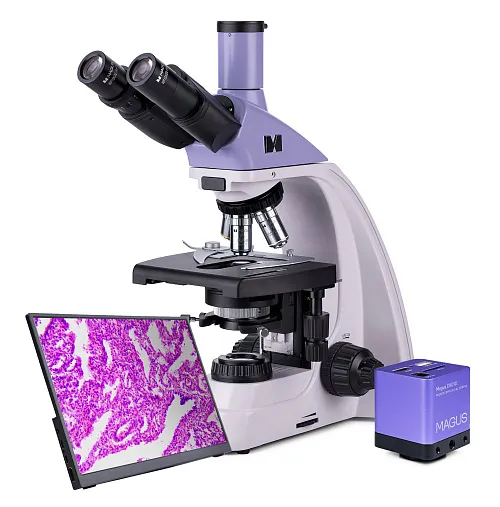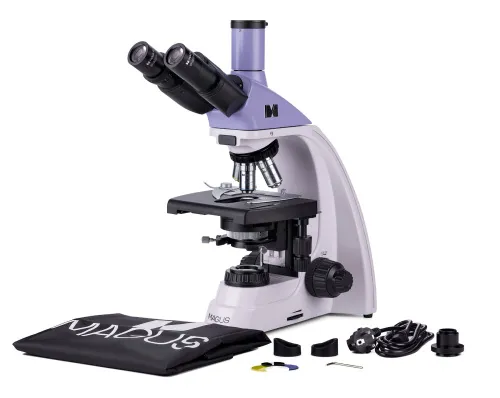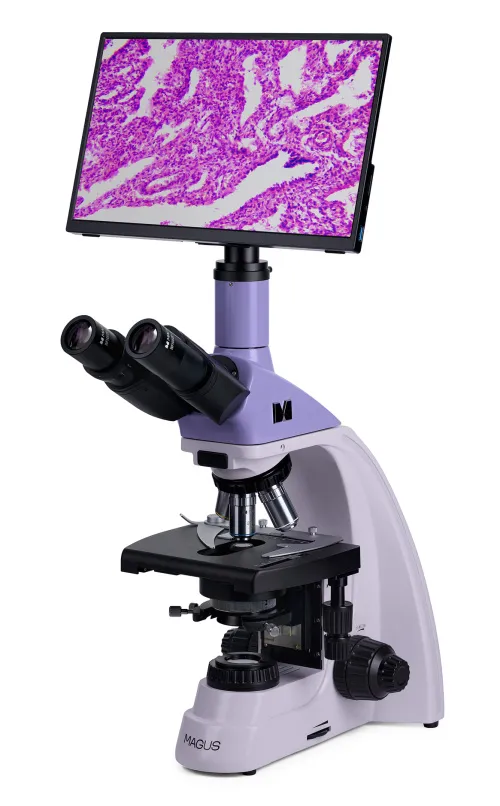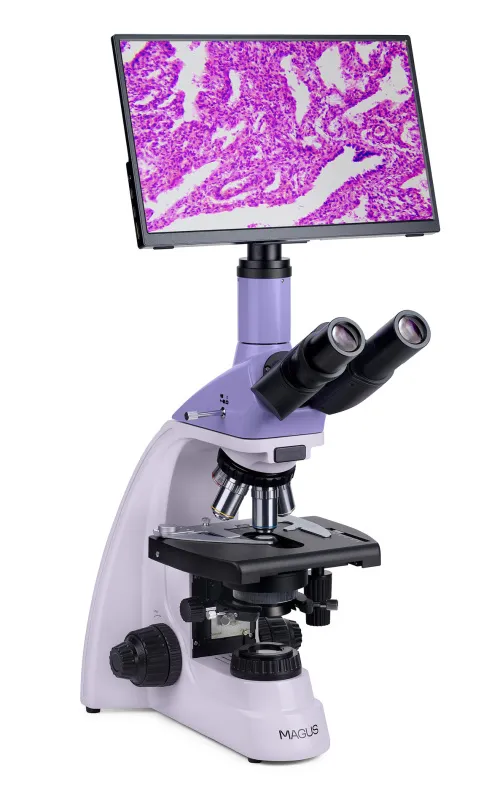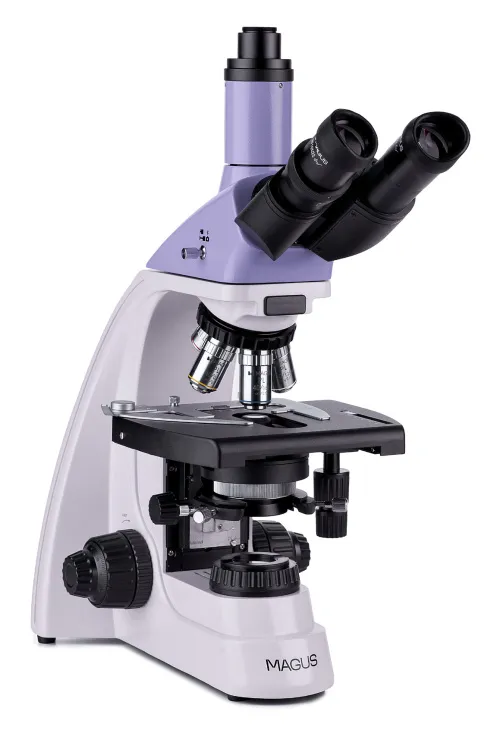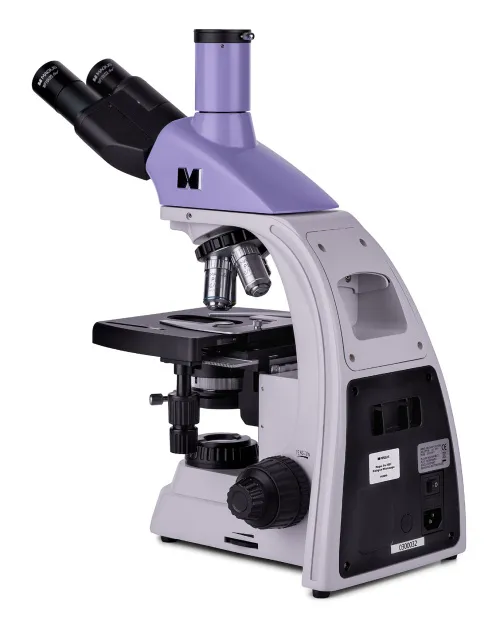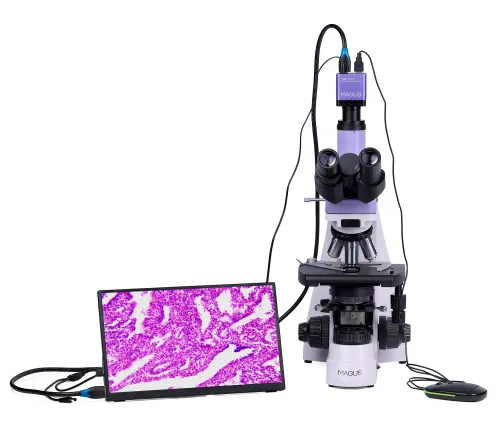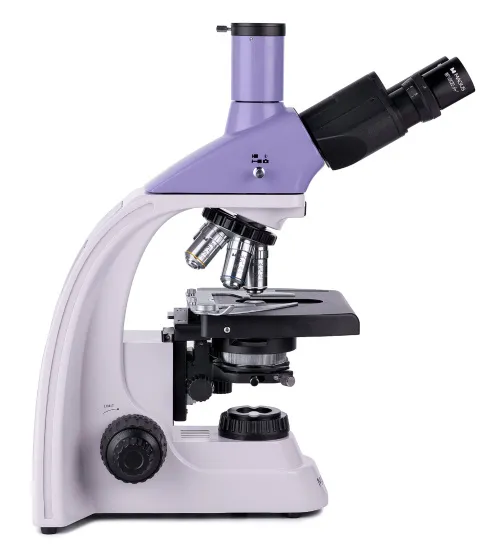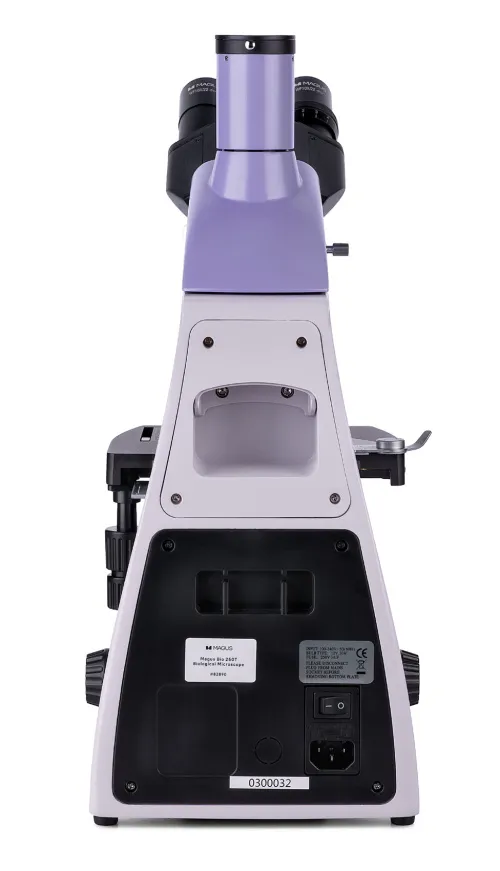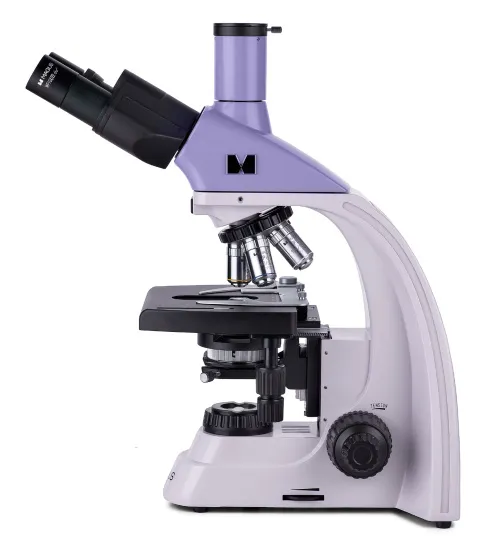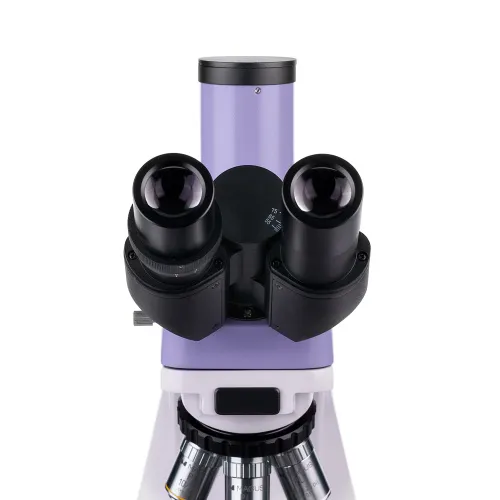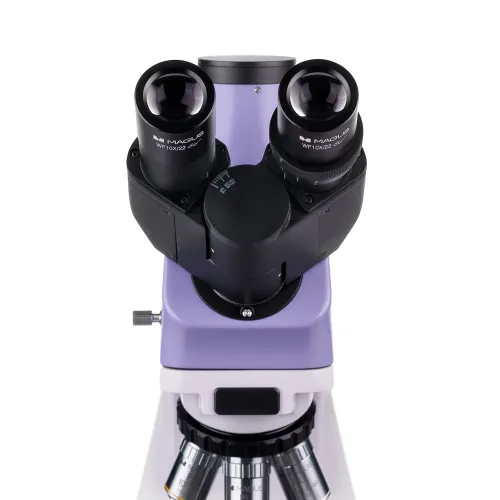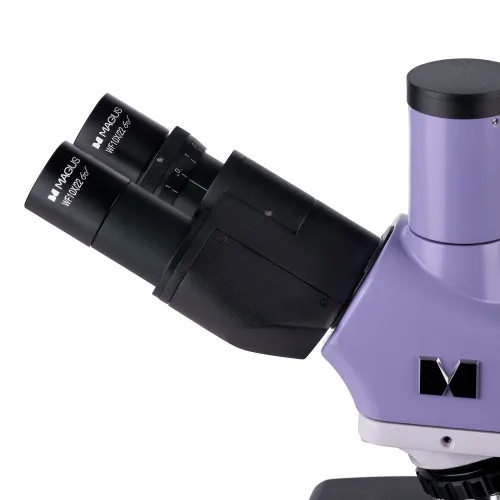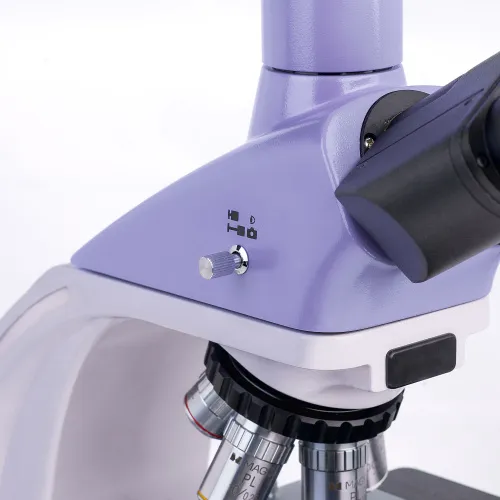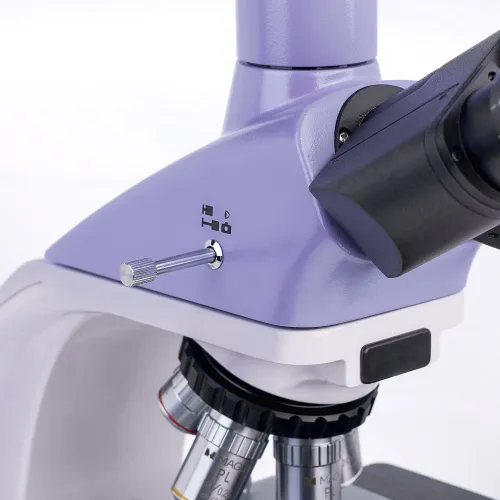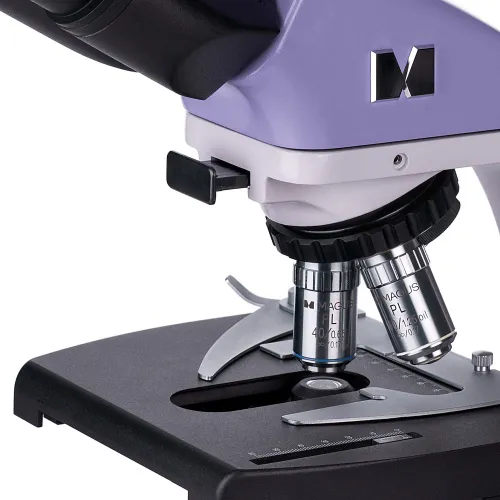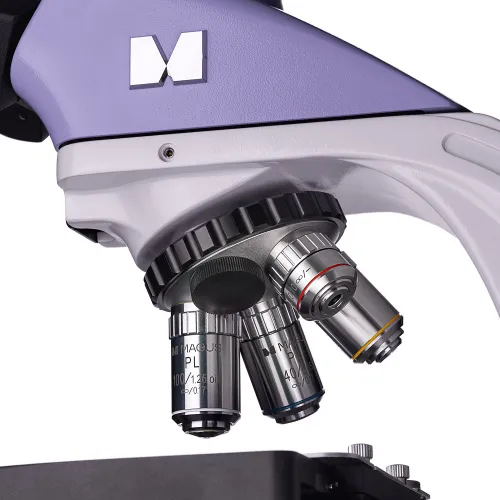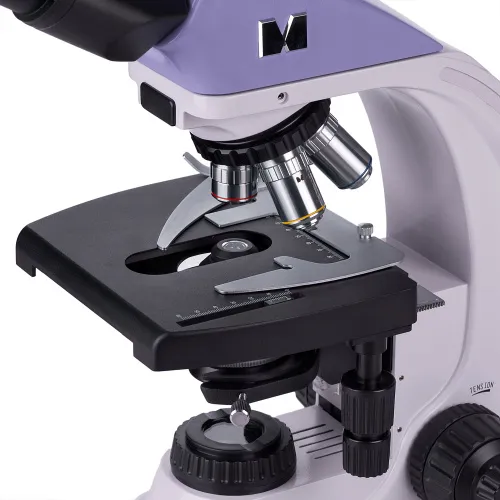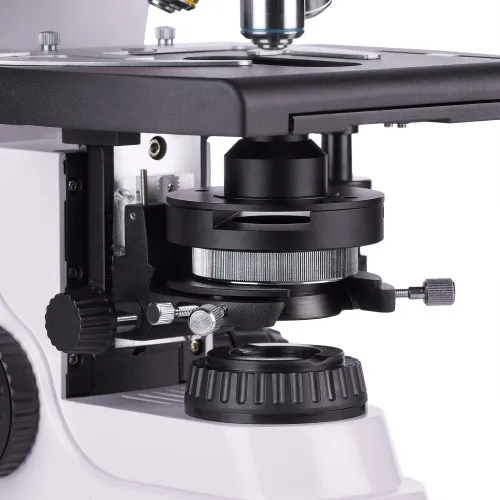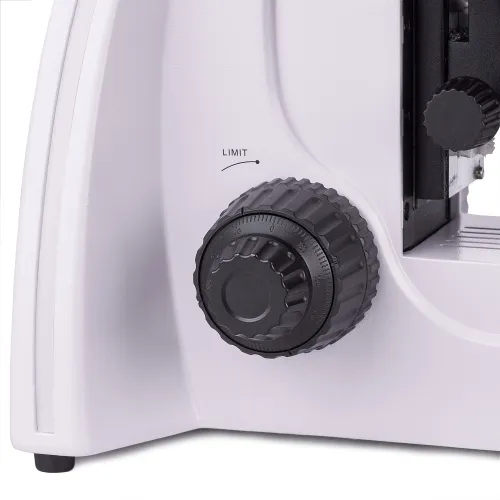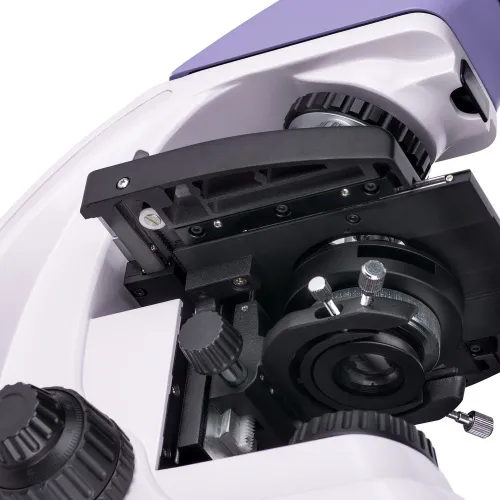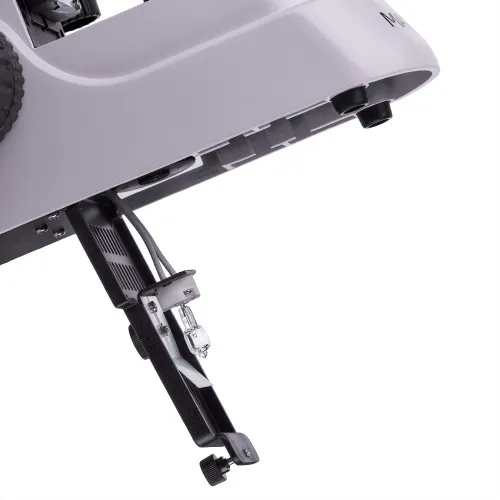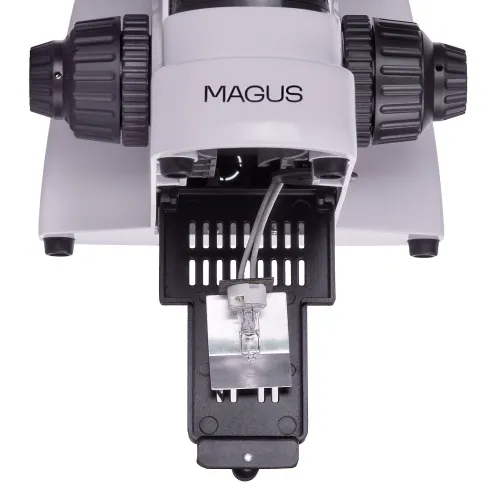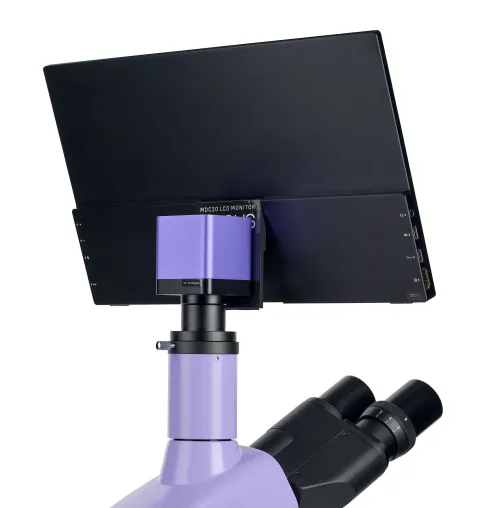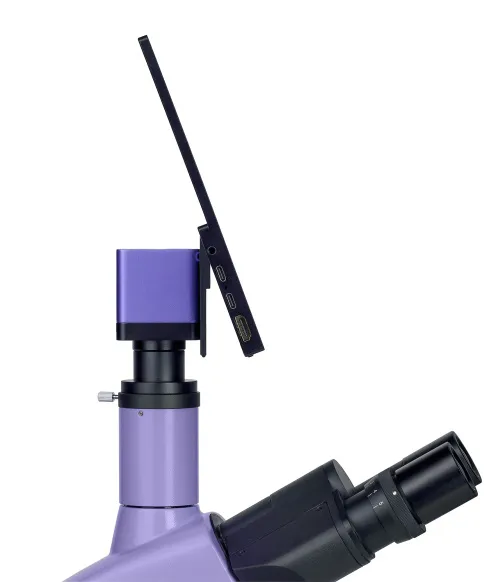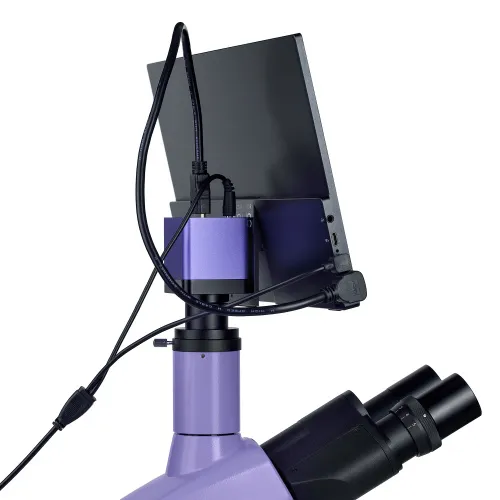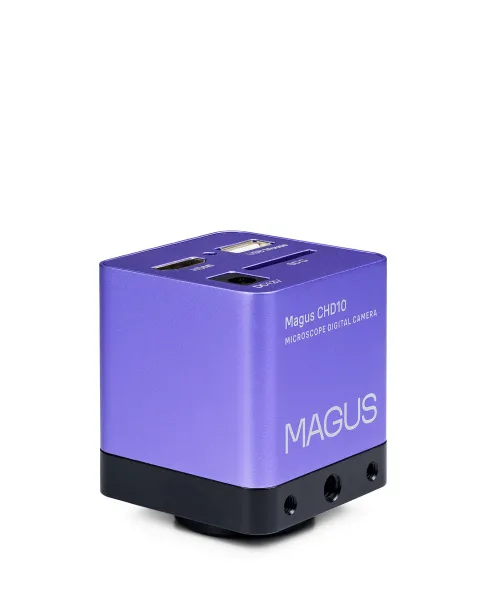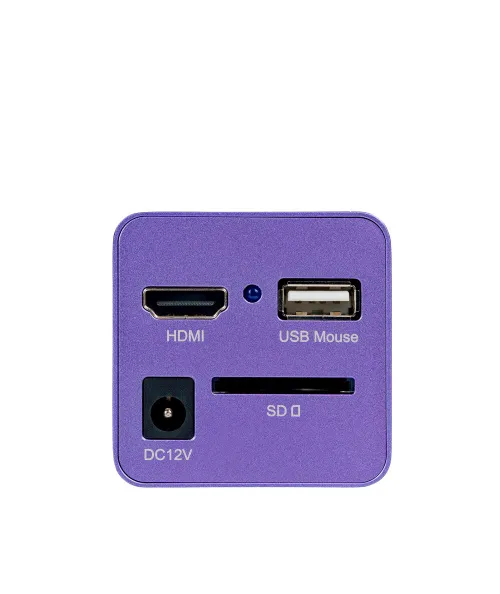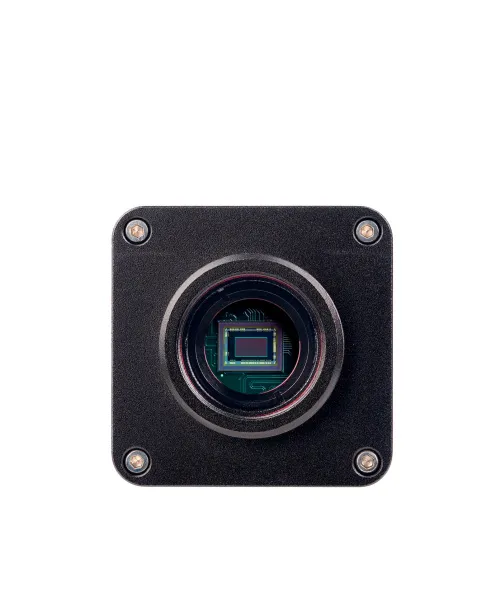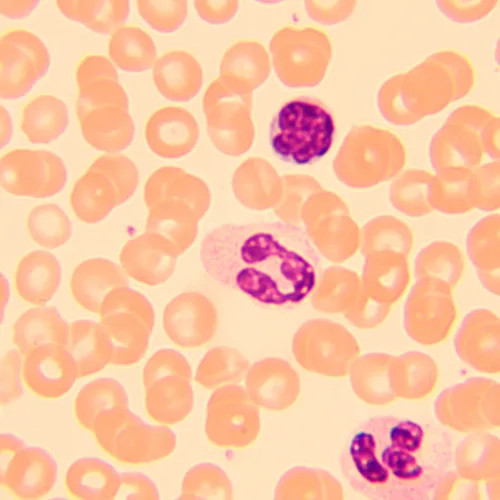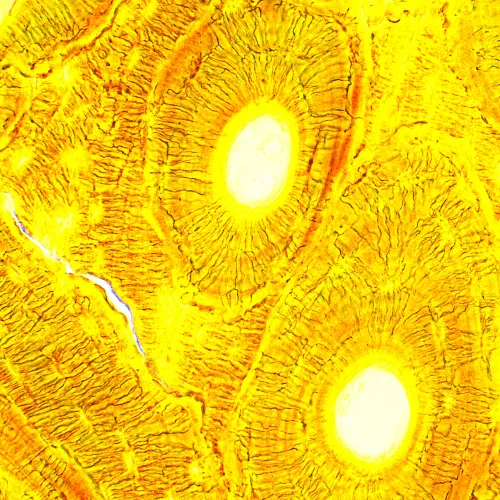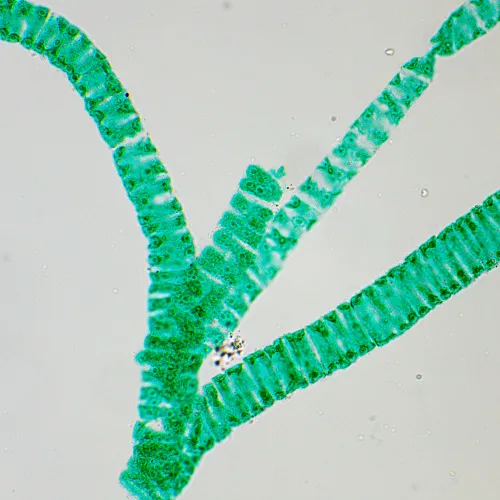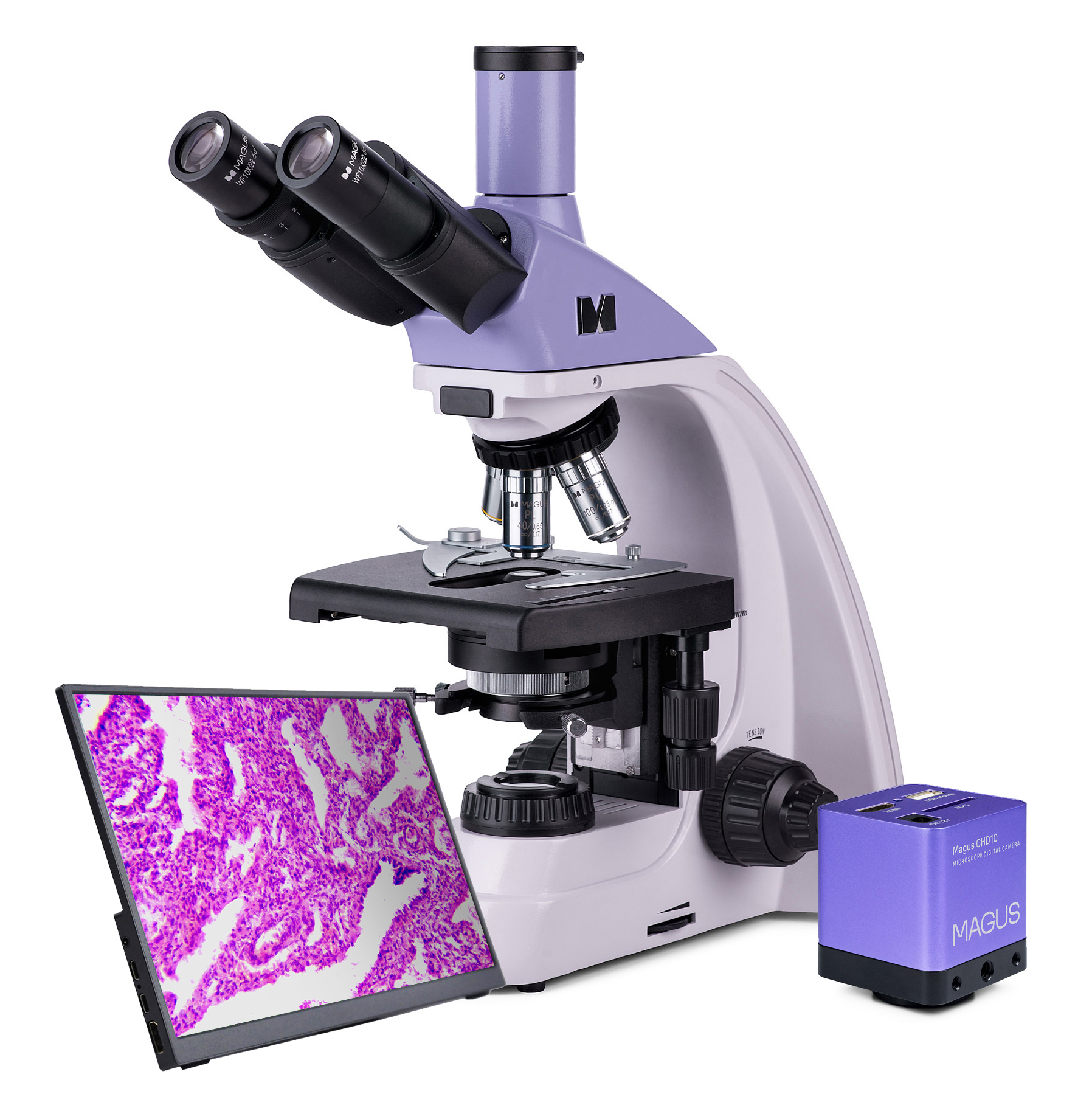MAGUS Bio D250T LCD Biological Digital Microscope
With a camera and monitor. Magnification: 40–1000x. Trinocular head, infinity plan achromatic objectives, 30W halogen bulb
| Product ID | 83009 |
| Brand | MAGUS |
| Warranty | 5 years |
| EAN | 5905555018034 |
| Package size (LxWxH) | 43x27x63 cm |
| Shipping Weight | 12.65 kg |
The MAGUS Bio D250T LCD biological microscope is a professional instrument for observing biological specimens in transmitted light. The primary observation technique is a brightfield technique (ready-to-use). Darkfield, polarization, and phase contrast techniques are also available, but they require additional microscope accessories. The microscope is excellent for laboratory and research observations in medicine, pharmaceuticals, forensics, agriculture, and other fields.
Digital camera
The digital HDMI-camera MAGUS CHD10 is equipped with a 2MP sensor and produces realistic Full HD images at a resolution of 1920x1080px. It is an autonomous camera that does not require connection to a computer or the installation of additional software. The camera can be connected directly to a TV, monitor, or projector to display an image. The HDMI interface provides a high and stable transfer rate from the camera to the external screen. Video is recorded at 60fps. The camera combines high FPS and high bandwidth HDMI. Therefore, videos are vivid, with no freezes or gaps between frames. At maximum resolution, the image is well-detailed, moving objects are visible without bugs, and object movement is displayed without delays.
Monitor
MAGUS MCD monitors work in combination with MAGUS CHD cameras to form a complete imaging system for MAGUS microscopes.
The connection to the camera occurs via its HDMI interface. The monitor displays real-time images. Its IPS LCD display has a wide viewing angle, high brightness, and good contrast. When looking at the screen even from a large angle, the image is not distorted. The screen size is 13.3''.
The monitor can be installed on a horizontal surface using a folding stand or mounted directly on a camera or tripod.
Optics
Plan achromatic objectives provide a clear, contrasty, and well-detailed image with minimal distortion. The magnification with included objectives and eyepieces ranges from 40 to 1000x, and the upper limit can be increased with additional eyepieces. The optics are infinity corrected, which means that additional accessories can be installed in the optical path.
The trinocular head has a separate vertical tube for mounting a digital camera (not included). It is positioned vertically. The trinocular head is equipped with 360° rotating tubes, and it is possible to adjust the diopter on the left tube. The design of the trinocular head allows you to easily adjust the eye relief to fit the height of the observer.
The revolving nosepiece with objectives is oriented toward the interior, and 5 objectives can be inserted into the revolver simultaneously – 4 objectives come with a kit, one slot is free. An additional objective will provide extra magnification within the magnification range.
Illumination
A 30W halogen bulb provides bright illumination allowing for good visibility of sample structures with any observation technique and any objective being used. The lighting is warm, which is more comfortable for the eyes during long hours of work. There is a brightness adjustment option. The lighting is powered by an AC power supply.
It is possible to set up the Köhler illumination thanks to a centered and height-adjustable Abbe condenser, aperture diaphragm, and field diaphragm. There is a slot in the condenser where a darkfield or phase contrast slider can be installed. The slider allows you to quickly switch between research techniques and that which improves performance.
Stage and focusing mechanism
The stage does not have a positioning rack, which improves the ergonomics. The mechanical attachment moves the object smoothly and can be removed for manual scanning.
The focusing knobs are located on both sides of the microscope body and closer to the base of the microscope, which allows you to put your hands on the table instead of holding them in the air when working for long periods of time. The knobs are coaxial, i.e. they are located on the same axis. The coarse focusing mechanism has a lock knob and tension adjustment. The focusing mechanism is smooth, and so you do not have to exert any effort when adjusting it.
Accessories
The line of optional accessories includes eyepieces, objectives, polarization devices, darkfield condensers, phase contrast devices, calibration slides, and digital cameras. Designed specifically for the MAGUS Bio D250T LCD microscope, the devices match the microscope optimally and maximize its capabilities.
Key features of the microscope:
- Trinocular head with a vertical tube for mounting a digital camera
- 360° rotating eyepiece tubes allow you to adjust it to fit the height of the user
- Diopter adjustment on the left tube, coarse focusing with a lock knob and coarse tension adjustment knob, fine focusing
- Observations in transmitted light, light source – 30W adjustable brightness halogen lamp
- The Abbe condenser with aperture diaphragm and field diaphragm allows you to set up the Köhler illumination
- Option to install phase contrast and darkfield sliders (there is a special slot in the condenser for their installation)
- A wide range of optional accessories
Key features of the camera:
- The camera operates autonomously without a connection to a PC or the installation of any software
- HDMI interface for high and stable data transfer rate
- The camera resolution is 1920x1080px – an ideal choice for displaying images on a Full HD monitor
- 60 fps for observing moving samples, recording video, and moving the sample without jerkiness or delays
- SONY Starvis color CMOS backlit sensor provides low noise level and high light sensitivity even in low-light conditions. You will get clearer, brighter, and more color-saturated images
- Software with photo, video recording, editing, external display, linear and angular measurements
The kit includes:
- MAGUS CHD10 Digital Camera (digital camera, HDMI cable (1.5m), USB mouse, 32GB SD memory card, AC power adapter 12V/1A (Euro), user manual and warranty card)
- MAGUS MCD20 LCD Monitor
- Base with a power input, transmitted light source, focusing mechanism, stage, condenser mount, and revolving nosepiece
- Abbe condenser
- Trinocular head
- Infinity plan achromatic objective: 4x/0.10
- Infinity plan achromatic objective: 10x/0.25
- Infinity plan achromatic objective: 40x/0.65 (spring-loaded)
- Infinity plan achromatic objective: 100x/1.25 oil (spring-loaded)
- Eyepiece 10x/22mm with a long eye relief (2 pcs.)
- Eyecup (2 pcs.)
- Filter (4 pcs.)
- C-mount camera adapter
- Bottle of the immersion oil
- AC power cord
- Dust cover
- User manual and warranty card
Available on request:
- 10x/22mm eyepiece with scale
- 12.5x/14mm eyepiece (2 pcs.)
- 15x/15mm eyepiece (2 pcs.)
- 20x/12mm eyepiece (2 pcs.)
- 25x/9mm eyepiece (2 pcs.)
- Infinity plan achromatic objective: 20x/0.40
- Infinity plan achromatic objective: 60x/0.80 (spring-loaded)
- Phase-contrast device
- Phase slider
- Darkfield condenser NA 0.9
- Oil darkfield condenser NA 1.36–1.25
- Darkfield slider
- Polarization devices
- Calibration slide
| Product ID | 83009 |
| Brand | MAGUS |
| Warranty | 5 years |
| EAN | 5905555018034 |
| Package size (LxWxH) | 43x27x63 cm |
| Shipping Weight | 12.65 kg |
| Monitor specifications | |
| Type | biological, light/optical, digital |
| Microscope head type | trinocular, digital screen/PC monitor |
| Head | Gemel head (Siedentopf, 360° rotation) |
| Head inclination angle | 30 ° |
| Magnification, x | 40 — 1000 |
| Magnification, x (optional) | 40–1200/1250/1500/1600/2000/2500 |
| Eyepiece tube diameter, mm | 30 |
| Eyepieces | 10х/22mm, eye relief: 10mm (*optional: 10x/22mm with scale, 12.5x/14; 15x/15; 20x/12; 25x/9) |
| Objectives | infinity plan achromatic: 4x/0.10; 10x/0.25; 40xs/0.65; 100xs/1.25 (oil); parfocal distance: 45mm (*optional: 20x/0.40; 60хs/0.80) |
| Revolving nosepiece | for 5 objectives |
| Working distance, mm | 21 (4x); 5 (10x); 0.66 (40xs); 0.36 (100xs); 8.8 (20x); 0.465 (60xs) |
| Interpupillary distance, mm | 48 — 75 |
| Stage, mm | 180x150 |
| Stage moving range, mm | 75/50 |
| Stage features | two-axis mechanical stage, without a positioning rack |
| Eyepiece diopter adjustment, diopters | ±5 (on the left tube) |
| Condenser | Abbe condenser, N.A. 1.25, center-adjustable, height-adjustable, adjustable aperture diaphragm, a slot for a darkfield slider and phase contrast slider, dovetail mount |
| Diaphragm | adjustable aperture diaphragm, adjustable iris field diaphragm |
| Focus | coaxial, coarse focusing (21mm, 39.8mm/circle, with a lock knob and tension adjusting knob) and fine focusing (0.002mm) |
| Body | solid aluminum |
| Illumination | halogen |
| Brightness adjustment | ✓ |
| Power supply | 220±22V, 50Hz, AC 110–220V, DC 5–12V/1A (Type-C), AC network |
| Light source type | 12V/30W halogen bulb, G4 |
| Light filters | yes |
| Operating temperature range, °C | -15...+55 |
| Operating temperature range, °C | 5...+35 |
| Ability to connect additional equipment | USB mouse, phase contrast device (condenser and objectives), darkfield condenser (dry or oil), polarization devices (polarizer and analyzer) |
| User level | experienced users, professionals |
| Assembly and installation difficulty level | complicated |
| Application | laboratory/medical |
| Illumination location | lower |
| Research method | bright field |
| Pouch/case/bag in set | dust cover |
| Weight, kg | 8 |
| Dimensions, mm | 200x436x400 |
| Sensor | SONY Starvis CMOS |
| Color/monochrome | color |
| Megapixels | 2 |
| Maximum resolution, pix | 1920x1080 |
| Sensor size | 1/2.8" (5.57x3.13mm) |
| Pixel size, μm | 2.9x2.9 |
| Interface connectors | HDMI 1.4 |
| Memory card | SD up to 32GB |
| Light sensitivity | 1300mV at 1/30s |
| Exposure time | 0.04ms–1000ms |
| Video recording | ✓ |
| Frame rate, fps at resolution | 60@1920x1080 (HDMI) |
| Place of installation | trinocular tube, eyepiece tube instead of an eyepiece |
| Image format | *.jpg |
| Video format | *.h264, *.mp4 |
| Spectral range, nm | 380–650 (built-in IR filter) |
| Shutter type | ERS (electronic rolling shutter) |
| Software | HDMI: built-in |
| System requirements | does not require a computer connection |
| Mount type | C-mount |
| Camera power supply | AC adapter 12V, 1A |
| Specifications of the AC power adapter | input: AC voltage 100–240V, 50/60Hz, output: DC voltage 12V/1A |
| Camera operating temperature range, °С | -10...+50 |
| Operating humidity range, % | 10 — 90 |
| Operating humidity range, % | 30 — 80 |
| Type of matrix | IPS |
| Display diagonal, inch | 13.3 |
| Display resolution, px | 1920x1080 (Full HD) |
| Aspect ratio | 16:9 |
| Brightness, cd/m² | 400 |
| Number of displayed colors | 16.7 m |
| Contrast | 1000:1 |
| Horizontal/vertical viewing angle, ° | 178/178 |
| Size of the visible screen area (WxH), mm | 295x165 |
| Pixel pitch (WxH), mm | 0.154x0.154 |
| Frequency of optical source, Hz | 60 |
| Type of matrix backlight | LED |
| LED backlight lifetime, h | 50000 |
| Interface | HDMI |
| Power consumption, W | 12 (max.) |
and downloads
We have gathered answers to the most frequently asked questions to help you sort things out
Find out why studying eyes under a microscope is entertaining; how insects’ and arachnids’ eyes differ and what the best way is to observe such an interesting specimen
Read this review to learn how to observe human hair, what different hair looks like under a microscope and what magnification is required for observations
Learn what a numerical aperture is and how to choose a suitable objective lens for your microscope here
Learn what a spider looks like under microscope, when the best time is to take photos of it, how to study it properly at magnification and more interesting facts about observing insects and arachnids
This review for beginner explorers of the micro world introduces you to the optical, illuminating and mechanical parts of a microscope and their functions
Short article about Paramecium caudatum - a microorganism that is interesting to observe through any microscope

